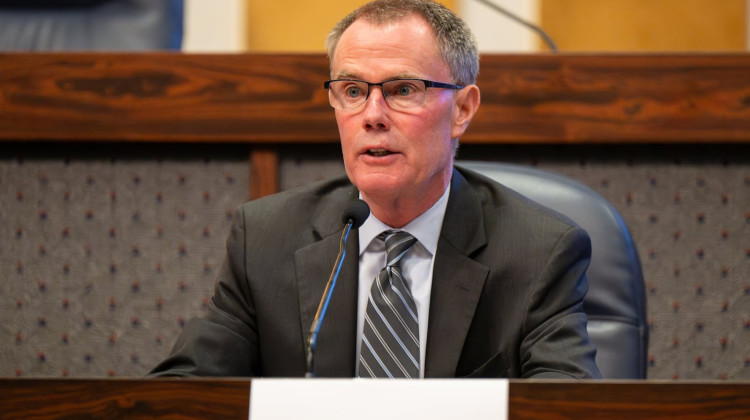
Mariama Shaheed, founder of Global Preparatory Academy charter school, speaks at Invent Learning Hub on Friday, Dec. 2, 2022. Shaheed and 28 Indianapolis charter school leaders are calling on Indianapolis Public Schools to share revenue from a property-tax referendum the district wants on the May 2023 primary ballot.
Eric Weddle / WFYILeaders of more than two dozen city charter schools are calling on Indianapolis Public Schools to share revenue from a property-tax levy the district proposed for next year’s ballot.
The collective wants IPS to share an equal amount of revenue among all public school students who live and attend a school within IPS boundaries. This would include students at all IPS schools, including innovation charters operated through a district agreement, and independent charter schools not affiliated with the district.
At a press conference Friday, the group warned that the racial and socioeconomic equity gap in the city would increase if the operating referendum is approved and the district won’t share the $51.7 million in annual revenue.
If the proposed referendum is approved by voters, charter leaders said, per-student funding in IPS-run schools would increase by around $2,300 but independent charter schools would receive none.
IPS leaders say the proposed funds are necessary to keep compensation competitive and implement an overhaul of academic programs to give all students the same options. Charter leaders say they too want local public funds to do the same.
“This is not an attack on [the] IPS district family,” said Eddie Rangel, executive director of Adelante Schools, an innovation charter elementary and middle school that serves K-8 students “This is not a public charter versus traditional public school issue. This is a racial equity issue.”
Rangel was joined by a collation of charter school leaders at Invent Learning Hub, including that school’s executive director Alechia Ostler. Mariama Shaheed of Global Preparatory Academy and Sarah Weimer of Christel House Indianapolis also spoke. The event came days after the group sent a letter explaning their position to Superintendent Aleesia Johnson and school board members.
In recent years, IPS grappled with whether to share referendum revenue with charter partners. A year ago, the board agreed to share a portion of its 2018 operation levy funds with 25 charter schools that operate with district support. Now the schools receive $500 per in-district resident student, a total of roughly $27.5 million for the remainder of the referendum.
If a new operation referendum is approved by voters, IPS will increase the shared amount to $650 per in-district resident student.
But the collective argues that is not enough and is a "textbook definition of inequity," as it creates a three-tiered system of school funding for schools in the IPS boundary. An area with a majority of low income families and children of color.
Rangel said around 23,000 students attend schools run by 29 charter operators asking for a share of revenue. Of those students, 85 percent are children of color, and 77 percent qualify for free or reduced meals due to family income.
It’s an unprecedented move for the Indianapolis charter sector to band together and demand action from the state’s largest school district. The collection of operators are independently minded and diverse, as some are neighborhood cornerstones founded in the early 2000s, and others recently opened and still finding their own footing.
Charter schools are public schools that are granted a contract to operate by one of several authorizers in Indiana, including the Indianapolis mayor’s office. Charter schools receive direct per-student funding similar to traditional school corporations and are eligible to receive additional per-student grants. But they don’t receive local property tax funds to cover transportation or facilities. And they don't receive referendum revenue unless a school district chooses to share it.
Earlier this year lawmakers considered legislation to require school districts to share referendum funds with charter operators, but it did not advance. Similar legislation is expected in the Statehouse session starting next month.
The collective said they won’t ask their communities to support the referendum when only certain schools and students receive equal funding.
“IPS and Indianapolis charter schools have yet another opportunity to show the state and the country who we are. And walk the talk of racial equity,” Rangel said. “Which is much more difficult than the flowery words many of us drafted or co-signed in the summer of 2020.”
IPS Responds
So far, IPS is not swayed. Superintendent Johnson said in a statement Friday the district would not share funds with non-IPS affiliated charters.
The funds are needed for the district to carry out its sweeping academic overhaul named Rebuilding Stronger that was approved last month by the school board.
“These are not promises that I, or the IPS Board of School Commissioners, make lightly. So, when we implement Rebuilding Stronger, we need to live up to all of our commitments,” Johnson said in a statement. “And what concerns me is that the proposal to include charters not affiliated with IPS provides no mechanism for the IPS administration or our publicly elected Board of School Commissioners to oversee those funds — which amounts to spending without accountability.”
Tuesday the IPS Board will vote to put the operating referendum and a $410 million capital referendum on the May primary ballot.
“We will only go to our taxpayers for funds if we can promise to be accountable for how they’re spent. We won’t ask if we can’t make that promise, as is the case here,” Johnson said.
Contact WFYI education editor Eric Weddle at eweddle@wfyi.org or call (317) 614-0470. Follow on Twitter: @ericweddle.
 DONATE
DONATE








 Support WFYI. We can't do it without you.
Support WFYI. We can't do it without you.